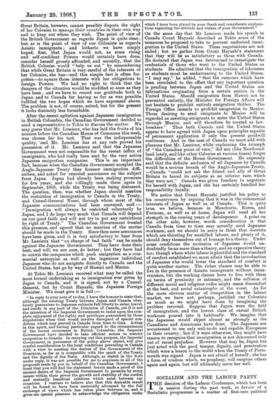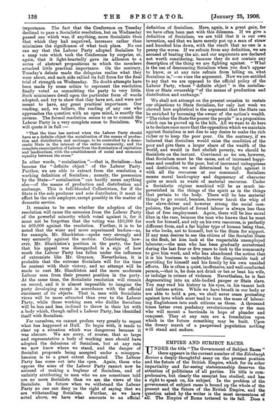SOCIALISM AND THE LABOUR PARTY. T HE decision of the Labour
Conference, which has been in session during the past week, in favour of a Socialistic programme is a matter of first-rate political importance. The fact that the Conference on Tuesday declined to pass a Socialistic resolution, but on Wednesday passed one which was, if anything, more Socialistic than that which they had negatived, increases rather than minimises the significance of what took place. No one can say that the Labour Party adopted Socialism by a snap vote which took the Conference by surprise, or, again, that it light-heartedly gave its adhesion to a series of abstract propositions to which the members attached little practical importance. On the contrary, Tuesday's debate made the delegates realise what they were about, and each side rallied its full force for the final trial of strength on Wednesday. No doubt attempts have been made by some critics to represent the resolution finally voted as committing the party to very little. Such minimisers dwell upon the particular form of words adopted, and try to show that they have not, and were not meant to have, any great practical importance. Our reading, and, we believe, the reading of any one who approaches the question with an open mind, is exactly the reverse. The formal resolution seems to us to commit the Labour Party in a very complete sense to Socialism. We will quote it in full :— "That the time has arrived when the Labour Party should have as a definite object the socialisation of the means of produc- tion and distribution and exchange, to be controlled by a demo- cratic State in the interest of the entire community, and the complete emancipation of Labour from the domination of capitalism and landlordism, with the establishment of social and economic equality between the sexes."
In other words, "socialisation "—that is, Socialism—has become the "definite object" of the Labour Party. Further, we are able to extract from the resolution a working definition of Socialism ; namely, the possession by the State—" socialisation" can hardly mean anything else—of the means of production and distribution and exchange. This is full-blooded Collectivism, for if the State is the sole producer and sole distributor, it must in effect be the sole employer, except possibly in the matter of domestic service.
It remains to be seen whether the adoption of the resolution will cause the secession from the Labour Party of the powerful minority which voted against it, for it must not be forgotten that the voting was 510,000 for to 469,000 against the resolution. Further, it is to be noted that the wiser and more experienced leaders—as, for example, Mr. Shackleton—spoke very strongly and very earnestly against the motion. Considering, how- ever, Mr. Shackleton's position in the party, the fact that his appeal was disregarded is a sign of how much the Labour Party has fallen under the influence of extremists like Mr. Grayson. Nevertheless, it is probable that the extreme Socialists will for the time be content with their victory, and no attempt will be made to oust Mr. Shackleton and the more moderate Labour men from their present position in the party. At the same time, the Socialistic resolution will remain on record, and it is almost impossible to imagine the party developing except in accordance with the official statement of its objects. That is, men with Socialistic views will be more attracted than ever to the Labour Party, while those working men who dislike Socialism will be less and less inclined to throw in their lot with a body which, though called a Labour Party, has identified itself with Socialism.
For ourselves, we cannot profess very greatly to regret what has happened at Hull. To begin with, it tends to clear up a situation which was dangerous because it was obscure. We are sorry, of course, that so large and representative a body of working men should have adopted the delusions of Socialism, but at any rate we now know where we stand, and the danger of Socialist proposals being accepted under a misappre- hension. is to a great extent dissipated. The Labour Party has come out into the open. Again, those who oppose the aims of the Labour Party cannot now be accused of making a bugbear of Socialism, and of unfairly attributing to men who we are sometimes told are no more Socialists than we are the views of the Socialists. In future when we withstand the Labour Party no one can deny us the right of saying that we are withstanding Socialism. Further, as we have noted above, we have what amounts to an official definition of Socialism. Here, again, is a great gain, for we have often been met with this dilemma. If we give a definition of Socialism, we are told that it is our own invention, and that we have merely put up a man of straw and knocked him down, with the result that no one is a penny the worse. If we refrain from any definition, we are accused of beating the air, and our arguments are declared not worth considering, because they do not contain any description of the thing we are fighting against. "What is the use of denouncing Socialism when you .don't appear to know, or at any rate refrain from telling us, what Socialism is,"—so runs the argument. Now we are entitled to say that we are opposed to the official policy of the Labour Party, whose "definite object" is the socialisa- tion or State ownership "of the means of production and distribution and exchange."
We shall not attempt on the present occasion to restate our objections to State Socialism, for only last week we showed how sophistical is the argument that the State can be enriched by becoming the owner of the nation's wealth. "The richer the State the poorer the people " is a proposition which can be proved up to the hilt. All we want to do here is to declare once more that the opposition which we maintain against Socialism is not due to any desire to make the rich richer or to keep the poor poor. On the contrary, if we believed that Socialism would raise the condition of the poor and give them a larger share of the wealth of the world, and would in fact abolish poverty, we should be Socialists on the instant. Convinced as we are, however, that Socialism must be the cause, not of increased happi- ness and comfort to the poor, but of increased unhappiness and destitution, we are determined to fight against it with all the resources at our command. Socialism means moral bankruptcy and degeneracy of character quite as much as waste of material resources. Under a Socialistic regime mankind will be as much im- poverished in the things of the spirit as in the things that pertain to the body. There will be less material things to go round, because, however harsh the whip of the slave-driver and however strong the social com- pulsion, the product of forced labour is always less than that of free employment. Again, there will be less moral fibre in the race, because the man who knows that he must work for himself, and rely on his own resources, is perfectly different from, and a far higher type of human being than, he who looks, not to himself, but to the State for support. If any man desires to see the citizen of the Socialist State in the flesh, let him look at the respectable unemployed labourer,—the man who has been gradually accustomed during the last four or five years to look to the community to give him work, and who has abandoned the notion that it is his business to undertake the disagreeable task of providing for himself and his family by his own unaided efforts. He is often a quiet, inoffensive, and well-conducted person,—that is, he does not drink or bet or beat his wife, or indulge in crimes of violence. Nevertheless, he is fast degenerating into an able-bodied pauper or State slave. You may read his history in his eyes, in his vacant look and listless action. While we have breath in our body or are able to hold a pen, we shall never cease protesting against laws which must tend to turn the mass of labour- ing Englishmen into such citizens as these. A thousand times better even predatory revolutionaries or the men who will mount a barricade in hope of plunder and conquest. They at any rate are a foundation upon which in the future something may be built. Upon the dreary marsh of a pauperised population nothing will stand and endure.





















































 Previous page
Previous page